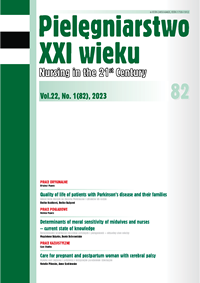Internet jako źródło informacji o pacjentach – Patient Targeted Googling
DOI:
https://doi.org/10.2478/pielxxiw-2023-0004Słowa kluczowe:
poszukiwanie w Internecie informacji o pacjentachAbstrakt
INTERNET JAKO ŹRÓDŁO INFORMACJI O PACJENTACH – PATIENT TARGETED GOOGLING
Wprowadzenie. Dostęp do zasobów Internetu spowodował zmiany w postrzeganiu zasad komunikacji międzyludzkiej, prywatności i dzielenia się informacjami osobistymi. Dla personelu medycznego pozyskane z Internetu dane mogą stanowić uzupełnienie informacji zebranych podczas wywiadu z pacjentem lub ukazać inny obraz jego funkcjonowania. W poszukiwaniu w Internecie informacji o pacjentach (Patient Targeted Googling – PTG) kluczowa jest ocena motywacji do takiego działania, poszanowanie praw pacjenta i uzyskanie jego zgody, przestrzeganie zasad etyki medycznej, a także ocena przydatności takiego postępowania dla procesu terapeutycznego. Pojawiają się jednak pytania, czy podawane przez pacjenta informacje są prawdziwe, a w odniesieniu do osób z zaburzeniami psychicznymi na ile są one zmienione przez zaburzenia poznawcze lub zaburzenia nastroju.
Cel pracy. Celem pracy jest przedstawienie wybranych zagadnień dotyczących poszukiwania w Internecie informacji o pacjentach przez członków zespołu terapeutycznego.
Metoda. Artykuł powstał w oparciu o analizę dostępnych badań i opracowań naukowych, dostępnych w bazach danych Medline oraz PubMed.
Podsumowanie. Opracowania naukowe potwierdzają obecność zjawiska PTG, odnoszą się do kwestii zasad etycznych, pozyskiwania zgody od pacjenta, wiarygodności umieszczanych treści i prawdziwej tożsamości pacjenta, umieszczania uzyskanych informacji w jego dokumentacji medycznej oraz ich znaczenia w kształtowaniu relacji pacjent - zespół terapeutyczny.
Bibliografia
1. de Araujo Reinert C, Kowacs C. Patient-Targeted „Googling:” When Therapists Search for Information About Their Patients Online. Psychodyn Psychiatry. 2019; 47 (1): 27-38. https://doi.org/10.1521/pdps.2019.47.1.27
2. Appelbaum PS, Kopelman A. Social media’s challenges for psychiatry. World Psychiatry. 2014; 13(1): 21-23. https://doi.org/10.1002/wps.20085
3. Ashby GA, O’Brien A, Bowman D, et al. Should psychiatrists ‘Google’ their patients? BJPsych Bull. 2015; 39(6): 278-283. https://doi.org/10.1192/pb.bp.114.047555
4. Clinton BK, Silverman BC, Brendel DH. Patient-targeted googling: the ethics of searching online for patient information. Harv Rev Psychiatry. 2010; 18(2): 103-112. https://doi.org/10.3109/10673221003683861
5. Lustgarten SD, Garrison YL, Sinnard MT, et al. Digital privacy in mental healthcare: current issues and recommendations for technology use. Curr. Opin. Psychol. 2020; 36: 25-31. https://doi.org/10.1016/j.copsyc.2020.03.012
6. Omaggio NF, Baker MJ, Conway LJ. Have You Ever Googled a Patient or Been Friended by a Patient? Social Media Intersects the Practice of Genetic Counseling. J. Genet. Couns. 2018; 27(2): 481-492. https://doi.org/10.1007/s10897-017-0206-4
7. Chiauzzi E, Wicks P. Digital Trespass: Ethical and Terms-of-Use Violations by Researchers Accessing Data From an Online Patient Community. J Med Internet Res. 2019; 21(2): e11985. https://doi.org/10.2196/11985
8. Balatsoukas P, Kennedy CM, Buchan I, et al. The Role of Social Network Technologies in Online Health Promotion: A Narrative Review of Theoretical and Empirical Factors Influencing Intervention Effectiveness. J. Med. Internet Res. 2015; 17(6): e141. https://doi.org/10.2196/jmir.3662
9. Guraya SS, Guraya S, Yusoff MSB. Preserving professional identities, behaviors, and values in digital professionalism using social networking sites; a systematic review. BMC Med. Educ. 2021; 21: 381. https://doi.org/10.1186/s12909-021-02802-9
10. Wu KS, Sonne JL. Therapist boundary crossings in the digital age: Psychologists’ practice frequencies and perceptions of ethicality. Professional Psychology: Research and Practice. 2021; 52(5): 419-428. https://doi.org/10.1037/pro0000406
11. Terrasse M, Gorin M, Sisti D. Social Media, E-Health, and Medical Ethics. Hastings Cent Rep. 2019; 49(1): 24-33. https://doi.org/10.1002/hast.975
12. Volpe R, Blackall G, Green M. Case study. Googling a patient. Commentary. The Hastings Center Report. 2013; 43(5): 14-15.
13. Chester AN, Walthert SE, Gallagher SJ, et al. Patient-targeted Googling and social media: a cross-sectional study of senior medical students. BMC Med Ethics. 2017; 18(1): 70. https://doi.org/10.1186/s12910-017-0230-9
14. Baker MJ, George DR, Kauffman GL Jr. Navigating the Google blind spot: an emerging need for professional guidelines to address patient-targeted googling. J. Gen. Intern. Med. 2015; 30(1): 6-7. https://doi.org/10.1007/s11606-014-3030-7
15. Frampton JR, Fox J. Monitoring, Creeping, or Surveillance? A Synthesis of Online Social Information Seeking Concepts. Review of Communication Research. 2020; 9: 1-42. https://doi.org/10.12840/ISSN.2255-4165.025
16. Fisher CE, Appelbaum PS. Beyond Googling: The Ethics of Using Patients’ Electronic Footprints in Psychiatric Practice. Harv. Rev. Psychiatry. 2017; 25(4): 170-179. https://doi.org/10.1097/HRP.0000000000000145
17. Eichenberg C, Herzberg PY. Do Therapists Google Their Patients? A Survey Among Psychotherapists. J. Med. Internet Res. 2016; 18(1): e3. https://doi.org/10.2196/jmir.4306
18. Sabin JE, Harland JC. Professional Ethics for Digital Age Psychiatry: Boundaries, Privacy, and Communication. Curr. Psychiatry Rep. 2017; 19(9): 55. https://doi.org/10.1007/ s11920-017-0815-5
19. Cole A. Patient-Targeted Googling and Psychiatry: A Brief Review and Recommendations in Practice. The American journal of psychiatry 2016; 11(5): 7-9. https://doi.org/10.1176/appi.ajp-rj.2016.110504
20. Frey WR. Humanizing Digital Mental Health through Social Media: Centering Experiences of Gang-Involved Youth Exposed to High Rates of Violence. Biomed Inform Insights. 2018; 10: 1178222618797076. https://doi.org/10.1177/1178222618797076
21. Ben-Yakov M, Kayssi A, Bernardo JD, et al. Do emergency physicians and medical students find it unethical to ‘look up’ their patients on facebook or Google? West J. Emerg. Med. 2015; 16(2): 234-239. https://doi.org/10.5811/westjem.2015.1.24258
22. Gershengoren L. Patient-targeted googling and psychiatric professionals. Int. J. Psychiatry Med. 2019; 54(2): 133-139. https://doi.org/10.1177/0091217418791459
23. DiLillo D, Gale EB. To google or not to google: Graduate students’ use of the internet to access personal information about clients. Training and Education in Professional Psychology. 2011; 5(3): 160-166. https://doi.org/10.1037/a0024441
24. Cox KE, Simonds LM, Moulton-Perkins A. Patient-targeted googling by psychological therapists: A narrative review of the literature and ethical implications. Counselling and Psychotherapy Research 2021; 00: 1-12. https://doi.org/10.1002/capr.12454.
Pobrania
Opublikowane
Numer
Dział
Licencja
Prawa autorskie (c) 2023 Autorzy

Utwór dostępny jest na licencji Creative Commons Uznanie autorstwa 4.0 Międzynarodowe.




